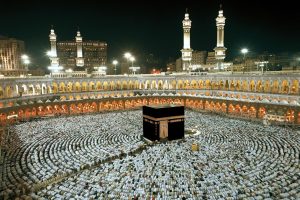
Professor Amtul Razzaq Carmichael, UK
Spirituality means knowing that our lives have significance in a context beyond a mundane everyday existence at the level of biological needs; and appreciating that we are a significant part of a purposeful unfolding of Life. [1] Spiritual development entails the exploration of the human experience beyond the physical realm and acknowledging the existence of the soul and the afterlife. Spirituality is recognised as an important part of human well-being as it leads to inner peace, personal growth and a deeper understanding of the self and the world around us.
Currently, Muslims are fasting during the month of Ramadan. Spiritual progress, in the religious sense, means to purify, hone, and consolidate one’s relationship with the Superior Being identified as God. Spiritual progress is a unique individual experience that enhances a believer’s understanding of God through the lens of personal experience. This in turn consolidates the connection with God to a higher, stronger and deeper level.
Spiritual progress is the process of seeking inner peace, energy, and healing along with a sense of purpose. Philosophy, social sciences, and medical sciences have all tried to develop a greater understanding of spirituality and spiritual progress. Islam provides a clear framework to facilitate the spiritual progress of an individual by offering structure, support, knowledge, and a practical blueprint to personalise the plan of spiritual progress. The Holy Qur’an mentions six levels of spiritual progress.
First Level of Spiritual Progress
The first level of spirituality is the commitment to Salat (the daily prayers). Allah Almighty says in the Holy Qur’an, ‘Surely, success does come to the believers, Who are humble in their Prayers,‘. [2] This verse gives the prerequisites that a believer must fulfil when embarking on the journey of spiritual progress. This involves turning to God in total humility and appreciating the grandeur of Divine majesty with complete dedication and commitment. Salat is the first milestone in the journey of spiritual progress and provides an opportunity to carve a personal bond of devoted connection with God. With increasing perseverance, the tenderness of heart facilitates a stronger connection with God, diminishing all other bonds that may stand in the way of spiritual progress.
Second Level of Spiritual Progress
The second level of spirituality is to aspire to shun all evil. As described in the verse of the Holy Qur’an, ‘And who shun all that which is vain‘[3]. A strong bond and clear connection with God empower one to forsake all useless, evil, and immoral actions. At the second level of spirituality, a believer develops a clear understanding that vain and useless pursuits hinder one’s personal and spiritual progress. This understanding, grounded in the strength of a true bond with God, empowers a believer to simply forsake any sinful and evil acts.
Third Level of Spiritual Progress
The third level of spiritual progress entails that a believer spends his pure earnings in the cause of God. As the Holy Qur’an says, ‘And who are active in paying the Zakat‘. [4] Spending money for the cause of God is the litmus test for the purity of one’s soul. Earnings are the outcome of one’s hard work on which one’s livelihood depends. At the third rung of the spiritual ladder, a believer employs all his abilities and capabilities for the sake of God. Spending one’s hard-earned money, in the pursuit of purity of soul, is a practical expression of true faith in God and gives a believer a pleasure that is unmatched by any other spending.
Fourth Level of Spiritual Progress
The fourth level of spiritual progress is to safeguard one’s chastity. It is mentioned in the Holy Qur’an, ‘And who guard their chastity‘. [5] At this very high stage of spiritual attainment, a believer displays impeccable moral practices in all aspects of life particularly in sexual conduct. It seems that the love of physical and sensory pleasures can be even greater than the love for money. Therefore, safeguarding their chastity is one of the most sacred duties of believers that elevates their spiritual progress.
Fifth Level of Spiritual Progress
The fifth level of spiritual progress is to honour one’s promises and pledges while adhering to the finer ways of God-fearing righteousness. In the Holy Qur’an, Allah the Exalted says, ‘And who are watchful of their trusts and their covenants‘. [6] Believers, at the fifth stage of spiritual development, go to great lengths to ensure that they do not overlook even the minutest act of goodness and become scrupulous in honouring their pledges and promises. At the fifth level of spiritual progress, believers have attained absolute purity of intent, commitment and integrity.
Sixth Level of Spiritual Progress
The sixth level of spiritual progress is that when a believer develops an unbreakably strong bond with God, they spend all their life connecting and consolidating this bond with God. As the Holy Qur’an says, ‘And who are strict in the observance of their Prayers.‘ [7] Their pleasures and delights lie in the remembrance of God, and they safeguard this connection like a treasured possession. They nurture their bond with God so that this is the only bond, the only connection and the only relationship that matters. This connection overarches all other relationships.
The month of Ramadan is an excellent opportunity to review our spiritual progress as a deeply personal and subjective experience. We must take this opportunity to appraise our own unique understanding and expression of spiritual standards against the commended levels of spirituality. This will facilitate for us to formulate a clear plan of progress on the path of spirituality. May Allah the Exalted enable us to do so. Ameen
About the Author: Professor Amtul Razzaq Carmichael MD, M Ed, FRCS (Gen Surg.), MBBS, is a consultant. She qualified in 1987 with gold medals for academic Excellence and undertook her surgical training at major teaching hospitals in London, Edinburgh and Philadelphia. She has authored many articles for major peer-reviewed scientific journals. She is a senior member of The Review of Religions Editorial Board as well as the Assistant Manager.
ENDNOTES
[2] The Holy Quran. Chapter 23: verses 2 and 3
[3] The Holy Quran. Chapter 23: verse 4.
[4] The Holy Quran. Chapter 23: verse 5.
[5] The Holy Quran. Chapter 23: verse 6
[6] The Holy Quran. Chapter 23: verse 9
[7] The Holy Quran. Chapter 23: verse 10




Add Comment